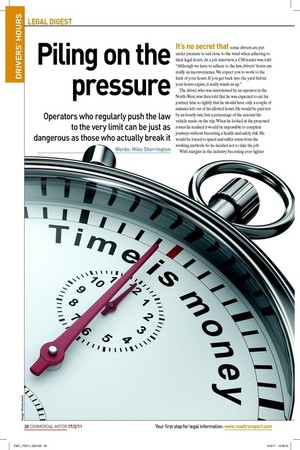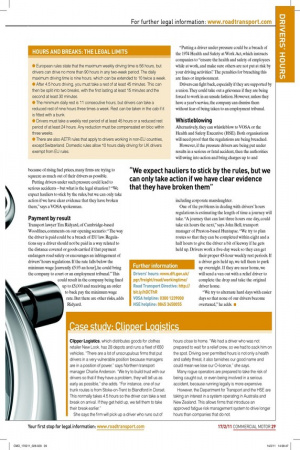Piling on the pressure
Page 22

Page 23

If you've noticed an error in this article please click here to report it so we can fix it.
Operators who regularly push the law to the very limit can be just as dangerous as those who actually break it
Words: Mike Sherrington It’s no secret that some drivers are put under pressure to sail close to the wind when adhering to their legal hours. At a job interview, a CM reader was told: “Although we have to adhere to the law, drivers’ hours are really an inconvenience. We expect you to work to the limit of your hours. If you get back into the yard before your hours expire, it really winds us up.”
The driver, who was interviewed by an operator in the North-West, was then told that he was expected to cut his journey time so tightly that he should have only a couple of minutes left out of his allotted hours. He would be paid not by an hourly rate, but a percentage of the amount his vehicle made on the trip. When he looked at the proposed routes he realised it would be impossible to complete journeys without becoming a health and safety risk. He would be forced to speed and suffer stress from the working methods. So he decided not to take the job.
With margins in the industry becoming ever tighter because of rising fuel prices, many irms are trying to squeeze as much out of their drivers as possible.
Putting drivers under such pressure could lead to serious accidents – but what is the legal situation? “We expect hauliers to stick by the rules, but we can only take action if we have clear evidence that they have broken them,” says a VOSA spokesman.
Payment by result
Transport lawyer Tim Ridyard, of Cambridge-based Woodines, comments on our opening scenario: “The way the driver is paid could be a breach of EU law. Regulations say a driver should not be paid in a way related to the distance covered or goods carried if that payment endangers road safety or encourages an infringement of drivers’ hours regulations. If the rate falls below the minimum wage [currently £5.93 an hour], he could bring the company to court or an employment tribunal.” This could result in the company being ined up to £5,000 and receiving an order to back pay the minimum wage rate. But there are other risks, adds Ridyard. “Putting a driver under pressure could be a breach of the 1974 Health and Safety at Work Act, which instructs companies to “ensure the health and safety of employees while at work, and make sure others are not put at risk by your driving activities”. The penalties for breaching this are ines or imprisonment.
Drivers can ight back, especially if they are supported by a union. They could take out a grievance if they are being forced to work in an unsafe fashion. However, unless they have a year’s service, the company can dismiss them without fear of being taken to an employment tribunal.
Whistleblowing
Alternatively, they can whistleblow to VOSA or the Health and Safety Executive (HSE). Both organisations will need proof that the regulations are being breached.
However, if the pressure drivers are being put under results in a serious or fatal accident, then the authorities will swing into action and bring charges up to and including corporate manslaughter.
One of the problems in dealing with drivers’ hours regulations is estimating the length of time a journey will take. “A journey that can last three hours one day, could take six hours the next,” says John Bell, transport manager of Preston-based Huntapac. “We try to plan routes so that they can be completed within eight and a half hours to give the driver a bit of leeway if he gets held up. Drivers work a ive-day week so they can get their proper 45-hour weekly rest periods. If a driver gets held up, we tell them to park up overnight. If they are near home, we will send a van out with a relief driver to complete the drop and take the original driver home.
“We try to alternate hard days with easier days so that none of our drivers become overtaxed,” he adds. ■












































